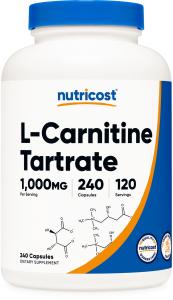L-Carnitine is an important amino acid that is responsible for transporting fatty acids to the mitochondria in a cell, where they can be burned for energy. It is naturally produced in the body, but can also be obtained through dietary sources such as meat and dairy products.
Aside from its role in energy metabolism, L-Carnitine has been studied for its potential benefits in a variety of conditions such as heart disease, diabetes, and weight loss. It is also commonly used as a workout supplement due to its ability to increase endurance and reduce muscle soreness.
However, it is important to note that while L-Carnitine has many potential benefits, it is not a magic pill and should not be relied on as the sole solution for any health condition or fitness goal. It is important to maintain a balanced and healthy diet, along with regular exercise, for optimal health and wellness.
In this article, we will explore the various benefits of L-Carnitine, as well as its potential side effects and recommended dosages. It is important to consult a healthcare professional before adding any new supplements to your regimen.
Benefits of L-Carnitine for Health and Fitness
L-Carnitine is a naturally occurring amino acid that is essential for the transportation of fatty acids into the mitochondria (energy-producing structures within cells) for energy production. Besides its prominent role in energy metabolism, L-Carnitine can also benefit people who are looking to improve their health and fitness. Here are some of the benefits of L-Carnitine:
Improves Athletic Performance
L-Carnitine supplementation has been shown to improve athletic performance by increasing endurance, reducing muscle fatigue, and enhancing recovery after exercise. It can help the body burn stored fat for energy during exercise, preserving muscle glycogen stores, which translates into improved physical performance and endurance.
Supports Weight Loss
L-Carnitine can aid weight loss by reducing fat mass and increasing muscle mass. It helps the body burn fat for energy, reducing the amount of stored body fat. L-Carnitine supplements can also help to reduce hunger, cravings, and the tendency to overeat, further supporting weight loss efforts.
Reduces the Risk of Chronic Diseases
L-Carnitine can help reduce the risk of chronic diseases such as type 2 diabetes, heart disease, and Alzheimer's disease. It can improve blood sugar control, cholesterol levels, and blood pressure, which are risk factors for chronic diseases. It can also protect against cellular damage and oxidative stress, which are involved in the development of chronic diseases.
Improves Brain Function and Mood
L-Carnitine can improve brain function, memory, and mood. It can increase acetylcholine levels in the brain, which is a neurotransmitter that is involved in memory and learning. It can also increase serotonin and dopamine levels, which are neurotransmitters that regulate mood and are often referred to as the “feel-good” chemicals.
Promotes Heart Health
L-Carnitine can promote heart health by improving cardiovascular function, reducing inflammation, and protecting against cellular damage. It can also help to reduce the risk of heart attack, stroke, and heart disease by improving blood flow and reducing the accumulation of plaque in the arteries.
Overall, L-Carnitine is a versatile supplement that can benefit people who are looking to improve their health and fitness. It can improve athletic performance, support weight loss, reduce the risk of chronic diseases, improve brain function and mood, and promote heart health. However, as with any supplement, it is important to consult with a healthcare professional before starting L-Carnitine supplementation.
Potential Risks and Side Effects of L-Carnitine Supplementation
While L-carnitine is generally considered safe for most people, its supplementation can lead to certain risks and side effects.
Here are some of the potential risks and side effects of L-carnitine supplementation:
- Gastrointestinal problems: L-carnitine supplementation can cause stomach upset, nausea, vomiting, diarrhea, and abdominal cramps in some people. These symptoms usually go away on their own after a few days of taking L-carnitine.
- Fishy odor: L-carnitine can produce a fishy odor in people taking high doses or with certain genetic conditions. This odor is harmless and can be mitigated by reducing the dosage of L-carnitine or using odor-neutralizing supplements.
- High blood pressure: L-carnitine supplementation may lead to a temporary increase in blood pressure in some people. This effect is more common among individuals with hypertension (high blood pressure) or those taking blood pressure medications.
- Interference with thyroid function: L-carnitine may inhibit the thyroid hormone's action in some people, leading to hypothyroidism (an underactive thyroid gland). This effect is more likely to occur in individuals with pre-existing thyroid problems.
- Drug interactions: L-carnitine supplements can interact with certain medications, including blood thinners, thyroid hormone medications, and blood pressure drugs. If you are taking any prescription or over-the-counter medications, talk to your doctor before taking L-carnitine supplements.
It is essential to buy L-carnitine supplements from reputable sources and follow the recommended dosage to avoid the risks and side effects. If you experience any adverse effects after taking L-carnitine, stop using it immediately and consult your doctor.
$25.95
$19.95
4.71 out of 5 starsNutricost L-Carnitine Tartrate 1000mg 240 Caps
Boost your energy and support fat metabolism with this high-quality L-Carnitine supplement
Product information
Product Review Score
Product links





